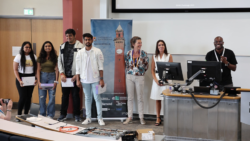Join our brilliant team at the University of Birmingham‘s Advanced Research Computing department (ARC), where you will have the opportunity to work with cutting-edge technology and innovative research projects at a world-class university. The University of Birmingham aspires to establish itself as a World Top 50 university by 2030, and ARC have a key part to play in … Continue reading “We’re recruiting! New Grade 8 Senior RSE&Manager and 5 Grade 8 Senior RSEs”
Category: Advanced Research Computing tips
BEAR Challenge 2023
“The event was fun, challenging, and insightful. The best part was that it gave me an opportunity to work and learn something new with my friends. Thank you, team!” This is a quote from one of the participants who attended the BEAR Challenge held between 19th-21st June. The aim of the challenge is to introduce … Continue reading “BEAR Challenge 2023”
Essential HPC tools – tmux
In this blog post on Advanced Research Computing tips, one of our Research Software Engineers, Dr James Allsopp, gives some tips on logging into Linux-based systems such as BlueBEAR and Baskerville, using tmux. Whenever I have to remote into a Linux-based system, one of the first things I look for is a program called tmux. … Continue reading “Essential HPC tools – tmux”
Requesting BEAR Services – 2022 changes
In April 2022 we have made some changes to how you can request BEAR services (including CaStLeS), and also changes to free vs. premium resources. In this post we’ll set out some of the changes, and help you choose the right forms to use. These changes were authorised by the Research Computing Management Committee in … Continue reading “Requesting BEAR Services – 2022 changes”
New Coding Club Starting Up in January!
[For sessions in May, June and July see here: https://blog.bham.ac.uk/bear/2022/04/26/further-codingclub-sessions-may-july/ ] We are setting up a Coding Club from January for researchers and staff at the University of Birmingham to help them meet the goal of the Software Sustainability Institute of “Better Software, Better Research” i.e. if the software is incorrect then the resulting research … Continue reading “New Coding Club Starting Up in January!”
Baskerville Basics
Baskerville is a GPU-focussed Tier 2 HPC cluster that attracts users from a wide range of disciplines and with varying levels of HPC experience. Since joining the ARC team one of my roles has been helping design a short training course called Baskerville Basics which provides useful information regardless of users’ research disciplines and HPC … Continue reading “Baskerville Basics”
Pure – How to add software as a ‘Research Output’
Pure is a Current Research Information System (CRIS), collecting a range of information about the University’s research. If you add software as a research output to your profile, the Research Portal draws information directly from Pure removing the need to enter the same information into more than one place. This makes your deposits readily available if you … Continue reading “Pure – How to add software as a ‘Research Output’”
Syncing issues with working offline on the Research Data Store
We have had reports of researchers making their Research Data Store (RDS) files available offline (in Windows), which then results in problems for other researchers on the project as the data is not always synchronised properly between users. To prevent problems with data syncing, please ensure that you do not set your RDS to be … Continue reading “Syncing issues with working offline on the Research Data Store”
Writing Code to Create Pretty Pictures and Practise Parallelism
Let me introduce myself, my name is Dr Keith Evans and I’m a Physicist and Research Software Engineer. I recently started in the BEAR Research Software group as HPC software support for BlueBEAR and HPC Midlands+. On my first day, my boss gave me an objective, to run some code on the HPCs. This meant … Continue reading “Writing Code to Create Pretty Pictures and Practise Parallelism”

